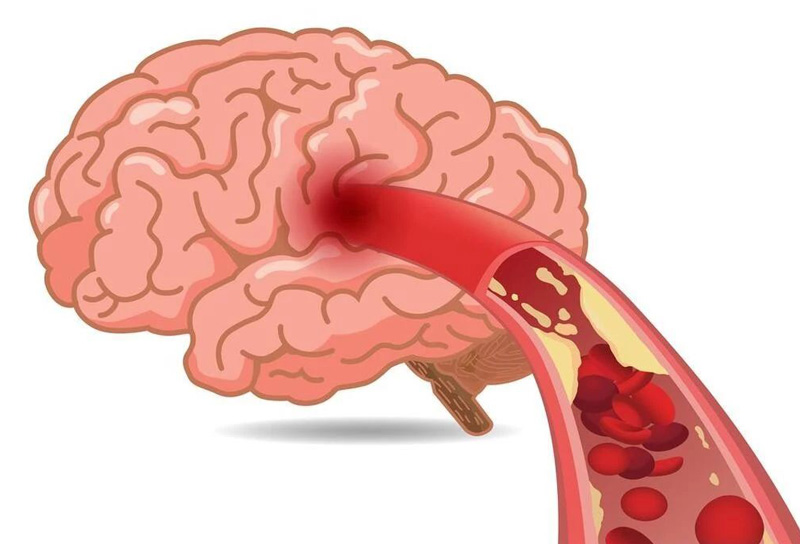Citicoline is one of the commonly used neuroprotective drugs in clinical practice. It has multiple pharmacological effects such as nourishing brain cells, improving brain circulation, and improving blood supply to the brain, etc. Citicoline is clinically recommended for the treatment of central nervous system diseases such as cerebral infarction, cerebral atrophy, brain trauma, senile dementia, and Parkinson's disease.
Although citicoline is relatively safe under conventional dosage, Citicoline can be used to treat central nervous system diseases such as cerebral infarction, Alzheimer's disease, and Parkinson's disease.
However, if long-term, large doses may still induce a variety of adverse reactions, especially for the elderly or patients with liver and kidney dysfunction are more likely to appear, so it must be taken according to the doctor's advice.
"Doctor, can citicoline be taken orally for a long time?"
"Doctor, what does citicoline do to the brain?"

Mr. Zhang, 68, a retired university professor, is normally in good health, except for occasional dizziness and memory loss.
In the recent physical examination, Mr. Zhang's brain magnetic resonance indicated that there were signs of mild brain atrophy. According to his imaging report, the doctor diagnosed him with brain atrophy accompanied by memory loss, so he prescribed a neuroprotective drug called citicoline and asked him to take it in a standard way.
After taking it according to the doctor's advice, Mr. Zhang's symptoms of dizziness and headache were alleviated a lot, so he bought it at the pharmacy and took it by himself for nearly 6 months. Recently, Mr. Zhang began to feel numbness and tingling in his limbs, and his symptoms gradually worsened, which made him feel very uneasy, so he went to the hospital again for a review, the doctor found that Professor Zhang's symptoms were related to the long-term use of citicoline.
He was advised to stop taking the drug and explained that although citicoline has a good neuroprotective effect, it should not be taken for a long time, otherwise it may cause some adverse reactions, resulting in limb numbness, tremor and other adverse reactions.
Professor Zhang followed the doctor's advice and stopped taking the medicine, and the numbness and tingling of the hands and feet were significantly relieved.

Brain atrophy refers to a pathological state in which the volume and quality of brain tissue are gradually reduced, usually manifested by the death of brain cells and the degeneration of neurons, and clinically manifested by memory loss, slow thinking, inattention and poor motor coordination.
Cerebral atrophy is more common in middle-aged and elderly people, and most of them have physiological cerebral atrophy. However, nearly 20% of patients with cerebral atrophy are related to pathological factors such as hypertension, diabetes, smoking and insufficient cerebral blood supply.
Such pathological cerebral atrophy is often accompanied by obvious clinical symptoms, and patients' self-care ability may be affected with the development of the disease. Therefore, for patients with brain atrophy, early identification and early intervention are very important, which can help delay the process of brain atrophy and improve the quality of life of middle-aged and elderly people.
1. Pathogenesis and characteristics of cerebral atrophy
Brain atrophy is one of the common clinical degenerative diseases of the central nervous system, which is mainly manifested by nerve cell apoptosis and brain cell space expansion, thereby causing a series of changes in the function of the central nervous system, especially in the elderly and some patients with neurodegenerative diseases are more common, among which the clinical manifestations of physiological brain atrophy are not obvious.
However, pathological brain atrophy can easily lead to a variety of clinical manifestations such as memory loss and abnormal emotional changes.

The pathogenesis of cerebral atrophy is very complex, which may be caused by the combined effects of the degenerative changes of neurons, the proliferation of glial cells, and the decrease of cerebral blood flow.
1. Neuronal injury and death
Neurons are the basic unit of the brain, and the damage of neurons may be caused by a variety of factors, including oxidative stress, metabolic disorders, protein accumulation, and inflammatory reaction, which will directly lead to the damage of the cell membrane, DNA and protein of brain cells, and eventually lead to the decline or death of neuron function, and then brain atrophy.
2. Insufficient blood supply to the brain
The decrease of cerebral blood flow is an important driving factor for the development of brain atrophy, and the brain has a very strong demand for oxygen and glucose.
When cerebral blood flow is insufficient or cerebrovascular disease, it will rapidly affect the function of neurons, resulting in neuronal hypoxia and insufficient nutrient supply, which leads to brain atrophy, especially in people with chronic diseases such as hypertension, arteriosclerosis and diabetes.

3. The response of glial cells
Glial cells, including astrocytes, oligodendrocytes and microglia, play an important role in supporting and protecting neurons. When glial cells have reactive hyperplasia, the secretion of various central neurotransmitters will be reduced, and the protective effect on nerve cells will be weakened, which will lead to central nerve cell damage and induce brain atrophy.
4. Genetic genetic factors
Some genetic factors have also been shown to be closely related to the occurrence and progression of brain atrophy, and these genetic factors may affect the occurrence of brain atrophy by regulating the survival, repair, inflammation and other processes of neurons.
The occurrence of brain atrophy is very insidious, and most people only know that they have brain atrophy when undergoing brain ct or brain magnetic resonance examination.
This is because the symptoms of patients with early brain atrophy are not obvious, and may only show short-term memory loss, which does not affect daily life. Active intervention at this stage can effectively delay the progress of brain atrophy.
However, if the risk factors always exist, it will cause the disease to worsen, and then cause the patient's attention, judgment, executive function and language ability will also be affected, and ultimately may lead to the loss of self-care ability, so for patients with pathological brain atrophy, early detection and early treatment is very important.
Mechanism of action and characteristics of citicoline
Citicoline is one of the commonly used nutritional drugs for brain cells. Its main component is an important biological molecule in the brain, which plays a key role in the structure and function of cell membrane.
Citicoline is not only one of the main components of neurons and cell membranes, but also plays an important role in many physiological processes and metabolic pathways. In particular, it has significant effects on neuroprotection and cognitive function.

The mechanism and characteristics of citicoline are mainly reflected in the following aspects:
1. Promote synthesis and repair of nerve membrane
Citicoline plays a key role in the phospholipid synthesis of nerve membranes. It helps maintain and repair the integrity of cell membranes by participating in the synthesis of phosphatidylcholine, which contributes to the stability of nerve conduction and reduces nerve damage.

2. Enhance cognitive function and memory
Citicoline can improve cognitive function by increasing the synthesis of the neurotransmitter acetylcholine, especially in memory and learning ability, and is often used clinically to treat a variety of central nervous system degenerative diseases such as Alzheimer's disease and Parkinson's disease.
3. Neuroprotective effect
Citicoline has the properties of a neuroprotective agent, which can protect neurons from damage by reducing oxidative stress and inflammatory response.
Studies have shown that Citicoline can inhibit apoptosis and have a positive effect on the recovery of the nervous system, helping to promote nerve regeneration.
4. Improve blood supply to the brain
Citicoline can improve the vasomotor ability by enhancing the function of vascular endothelial cells, thus helping to improve the blood flow to the brain.
Citicoline can improve blood viscosity and reduce blood coagulation to a certain extent, thus promoting blood flow and improving blood supply to the brain.
Citicoline is commonly used in clinical treatment of 4 diseases
Citicoline has a good therapeutic effect for a variety of central nervous system diseases, and it has multiple functions such as nourishing nerves and regulating neurotransmitters, but it is necessary to pay attention to the dose and method of taking it.
1. Alzheimer's Disease
Alzheimer's disease, also known as senile dementia, is a common neurodegenerative disease characterized by memory loss, cognitive decline and behavioral abnormalities.
Citicoline, as a neuroprotective drug, can promote the repair and regeneration of nerve cells and improve the function of brain cells.
Clinical studies have shown that citicoline can significantly improve the cognitive function of Alzheimer's patients, slow down the progression of the disease, and improve memory and learning ability, especially in early or middle stage patients.

2. Cerebral infarction
Cerebral infarction is one of the common clinical central system diseases, also known as ischemic stroke, such patients often appear movement disorders, speech disorders and cognitive disorders and other symptoms.
By improving the metabolism of brain cells and repairing damaged nerve tissue, citicoline can effectively promote the recovery of brain function and alleviate movement and language disorders.
Clinical studies have shown that citicoline can effectively improve the neurological function of patients with cerebral infarction, improve the ability of daily living, and help patients recover some cognitive function and motor ability.
3. Traumatic brain injury
Traumatic brain injury can result in varying degrees of brain damage, with symptoms including disturbance of consciousness, memory loss, and limited motor function.
Citicoline has a significant neuroprotective effect by promoting the repair of damaged nerves, reducing oxidative stress and neuroinflammatory response.
Clinical studies have shown that citicoline can significantly improve the clinical symptoms of patients with traumatic brain injury and promote the recovery after brain injury, especially in the early intervention with better results.
4. Brain atrophy
Phosphocholine has shown positive effects in the prevention and treatment of brain atrophy, promoting nerve repair, improving cognitive function and providing multiple mechanisms of neuroprotection, alleviating clinical symptoms related to brain atrophy, and delaying the progression of brain atrophy.
Clinical studies have shown that citicoline can effectively improve memory and cognitive function in patients with brain atrophy, and can effectively improve the development of brain atrophy and improve the prognosis of patients.
Do patients with brain atrophy need long-term oral citicoline?
Since citicoline has a variety of protective effects on the central nervous system, do patients with brain atrophy need to take citicoline for a long time?
The answer is that there is no need for long-term use, and it is clinically recommended that patients with brain atrophy can take citicoline under the guidance of a doctor, usually for a period of about 3 months, otherwise long-term use is easy to lead to a variety of adverse reactions.
Scientific use of citicoline attention 5 points
The safety of citicoline is good, but if long-term use may still induce a variety of adverse reactions, it is recommended that patients in need be standardized under the guidance of doctors to ensure efficacy and reduce adverse reactions.
1. Pay attention to the dosage of citicoline
The routine administration of citicoline is 1-2 capsules each time, 3 times a day;
Secondly, because citicoline is easy to cause gastrointestinal discomfort, it is recommended that patients with chronic gastrointestinal diseases take it after meals;
Finally, citicoline often does not need to be taken for a long time, and it is recommended that patients in need control the cycle of taking within 3-6 months to avoid causing a variety of adverse reactions.
2, pay attention to adverse reactions of citicoline
The most common adverse reactions of citicoline were gastrointestinal reactions, such as nausea, vomiting and diarrhea.
Secondly, some patients may have central nervous system adverse reactions such as headache and dizziness in the initial stage of medication.
Third, very few patients are allergic to citicoline, resulting in rash and pruritus.
Finally, a very small number of patients who take citicoline will induce extrapyramidal reactions, resulting in numbness, tremor, and adverse activity of the limbs, and such patients must immediately stop taking the drug.
3. Pay attention to drug use for special groups
Pregnant women and breastfeeding women are prohibited, lack of safety data;
Contraindicated in minors, lack of clinical data;
The elderly should start with low dose and monitor liver and kidney function regularly.
Contraindicated in patients allergic to citicoline;
Use with caution in acute stage of hemorrhagic disease.
4. Note that citicoline should be avoided in combination with some drugs
Antiepileptic drugs: Antiepileptic drugs may affect the metabolism of citicoline and reduce its efficacy;
Chlorocholine: Citicoline should not be used in combination with drugs containing chlorocholine. Chlorocholine is a class of antipsychotic drugs. When used in combination with Citicoline, significant dyskinesia occurs, including tremor, muscle rigidity, bradykinesia and other extracorporeal reactions.
5, regular monitoring of efficacy and safety
Long-term use of citicoline patients should be regularly followed up to monitor cognitive function and liver and kidney function indicators to ensure the efficacy and safety of the drug.






